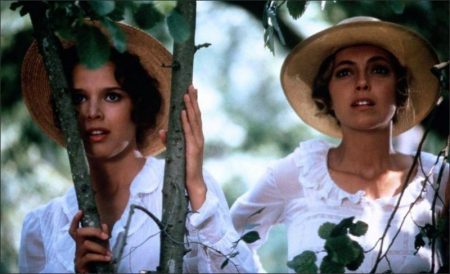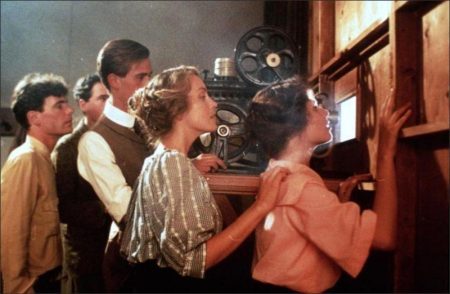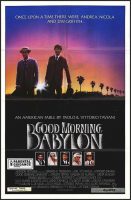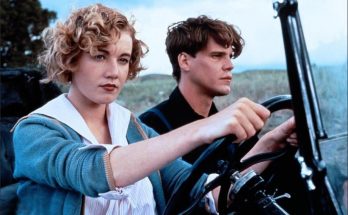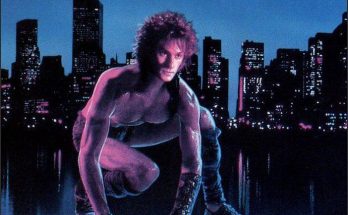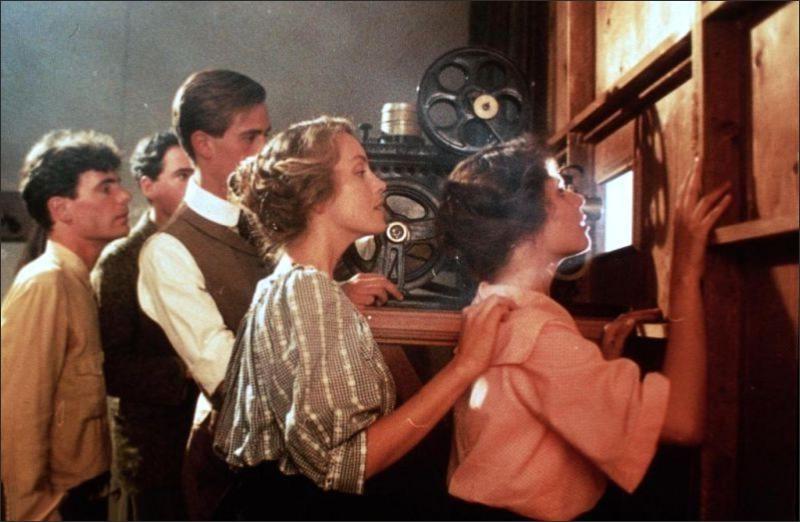Taglines: Once upon a time there were Andrea, Nicola and D.W. Griffith…
Good Morning, Babylon movie synopsis. After the bankruptcy of their father’s stonemasonry firm, Nicola and Andrea emigrate to America to restore their fortunes. After many adventures and near-disasters, they end up in Hollywood designing sets for D.W. Griffith and marry beautiful actresses, but tragedy strikes with the arrival of World War I, which finds the brothers fighting on opposite sides.
Good Morning, Babylon (Italian: Good morning Babilonia) is an Italian film directed by Paolo and Vittorio Taviani in 1987. It stars Vincent Spano, Joaquim De Almeida, Greta Scacchi, Désirée Becker, Omero Antonutti, Charles Dance, Bérangère Bonvoisin, Margarita Lozano, Dorotea Ausenda and Daniel Bosch. It was screened out of competition at the 1987 Cannes Film Festival. The film follows the story of two Italian brothers who emigrate to America and find work as set designers for D.W. Griffith’s silent film epic Intolerance (1916).
Film Review for Good Morning, Babylon
THE rosy style of Paolo and Vittorio Taviani, with its radiant physicality and its intoxicating sense of magic, has most often been used to create cinematic folk tales (“The Night of the Shooting Stars,” “Chaos,” “Padre Padrone”) about Italian peasantry. It is considerably less at home in the Hollywood of 1916, the backdrop against which the Tavianis’ “Good Morning, Babylon” unfolds. Never has Hollywood, a place more commonly viewed with cynicism and awe, been romanticized this rhapsodically. It took the Tavianis to view a tale of two immigrant stonemasons, who work on the sets for D. W. Griffith’s “Intolerance,” as a parable concerning brotherhood, honor, filial loyalty and the very essence of art.
So there are moments when “Good Morning, Babylon,” which opens today at Cinema 1, seems to have taken leave of its senses entirely, and these moments occur more and more frequently as the film proceeds. But “Good Morning, Babylon,” which is described as “an American fable,” gets off to a charming start. It finds two brothers, Andrea (Joaquim De Almeida) and Nicola (Vincent Spano), at work with the rest of their siblings on a church restoration in their native Tuscan village. Their father, whose approval means everything to his sons, later singles out these two for particularly high praise.
Just as the Tavianis discover a raw, earthy humor in the family rivalry thus engendered, so do they also give a rich, painterly beauty to a scene of the many brothers at dinner. The Tavianis’ gorgeous visual effects are achieved almost offhandedly, with a casualness that’s even comic, so that a scene of Andrea and Nicola at work in a pigpen is no less ravishing than anything else in the film.
Having broken loose from their family and traveled to America – the voyage is encapsulated by a tin plate’s sliding from brother to brother as they travel on rolling seas – Nicola and Andrea work their way west. As they go, they take something of the Tavianis’ Italy with them, from the stunning landscapes these film makers can find anywhere to one brother’s way of making a rude, defiant gesture to an offending vulture.
When the brothers reach San Francisco and help complete the magnificent Italian Pavilion for the Exposition there, “Good Morning, Babylon” begins to invoke the presence of D. W. Griffith, and begins to go wrong. Griffith, seen here as one of the reigning visionaries of his day, might be expected to dominate the film, but he never achieves that kind of stature.
Instead, he’s presented as a good-humored lightweight, boasting with bizarre precision that he can make a film “300 times better” than one that has impressed him, or playing the great man to his adoring wife. “Are you thinking of your old idea?” she asks, in the awkward, artificial tone that characterizes much of the Tavianis’ screenplay. “Intolerance” – I can always tell when it crops up in your head.” Though he is wryly impersonated by Charles Dance, this Griffith, who ultimately hires the brothers to build elephants for his Babylon set and becomes a jocular father figure for them, too frequently plays the fool.
In Hollywood, the brothers find rivals who challenge their manhood (”We are the sons of the sons of the sons of Michelangelo and Leonardo!” one brother angrily declares. “Whose sons are you?”). They also encounter two ripe, acquiescent nymphs named Mabel (Desiree Becker) and Edna (Greta Scacchi), whose claims to hard-heartedness are belied by their sunny good looks.
“Remember, we promised each other we only go out with directors or producers,” one tells the other, but they soon fall for the brothers’ evident charm. In one scene, each man proudly offers his future bride a firefly he has caught for her, and the moment would seem ludicrous if it weren’t also so sweet. The film’s playful tone allows for some mockery of these courtship rituals anyhow, as when Nicola writes a love letter telling Edna she is “as beautiful as a snowy mountain,” and the phrase “snowy mountain” becomes a joke all over town.
Enjoyable as it initially is, “Good Morning, Babylon” passes the point of no return when it begins to celebrate the burgeoning film industry’s great fellowship, to sentimentalize these early days and to make unsuccessful attempts at interweaving the brothers’ lives with the larger story around them. The film’s very loveliness begins to seem wildly inappropriate, as do its occasional flashes of solemnity. And toward the very end, as the film attempts bolder and bolder strokes of plot development with ever crazier leaps, the Tavianis’ expertly crafted bubble just about bursts. Neither their feelings about film making nor their feelings about brotherhood, surely this film’s two main subjects, come through clearly.
“Good Morning, Babylon” has been acted with just the right earnestness by a cast whose slightest hint of flippancy might have scuttled the entire thing. Mr. Spano, in a marked departure from earlier street-smart roles, plays the proud, diligent and oddly childlike Nicola particularly well.
Good Morning, Babylon (1987)
Directed by: Paolo Taviani, Vittorio Taviani
Starring: Vincent Spano, Joaquim De Almeida, Greta Scacchi, Désirée Becker, Omero Antonutti, Charles Dance, Bérangère Bonvoisin, Margarita Lozano, Dorotea Ausenda, Daniel Bosch
Screenplay by: Paolo Taviani, Vittorio Taviani
Production Design by: Gianni Sbarra
Cinematography by: Giuseppe Lanci
Film Editing by: Roberto Perpignani
Costume Design by: Gianni Sbarra
Set Decoration by: Massimo Spano
Art Direction by: Lorenzo D’Ambrosio
Music by: Nicola Piovani
Distributed by: Vestron Pictures
Release Date: May 13, 1987
Views: 213
